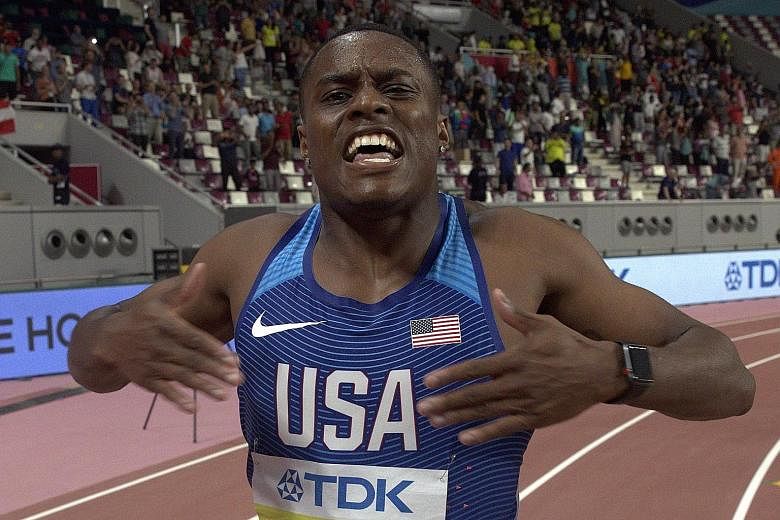PARIS • World champion sprinter Christian Coleman will appeal against his two-year ban from athletics for anti-doping violations, his manager said yesterday.
"The decision of the disciplinary tribunal established under World Athletics rules is unfortunate and will be immediately appealed to the Court of Arbitration for Sport," Emanuel Hudson tweeted via the HSI sports management firm, which represents the 24-year-old.
"Mr Coleman has nothing further to say until such time as the matter can be heard in the court of jurisdiction."
Coleman, who won the men's 100 metres at last year's world championships in Doha, Qatar, in a world-leading time for the season of 9.76 seconds, was provisionally suspended for three whereabouts failures in June.
World Athletics' disciplinary tribunal upheld the charge and banned the American for two years, backdated to May 14.
Should the ban remain in place, he will miss next year's Olympic Games in Tokyo, where he would have been among the favourites to win 100m gold and it is not known when his appeal will be heard.
Compatriot and 2004 Athens Games gold medallist Justin Gatlin did not compete in Beijing four years later after incurring a four-year doping ban, making him the last 100m champion who did not defend his title.
Coleman, who is also the 60m world record holder, ran only in the 4x100m relay heats in his first Olympic appearance in Rio de Janeiro four years ago.
The Athletics Integrity Unit (AIU) charged him for missed tests in January and December 2019, as well as for a "filing failure" last April. To prove an anti-doping violation, an athlete has to have committed three whereabouts failures within 12 months.
Coleman, who has failed a drug test, previously escaped suspension on a technicality ahead of last year's world championships.
Those three whereabouts failures were recorded on June 6, 2018 and Jan 16 and April 26 last year.
However, Coleman had successfully argued that the first missed case should have been backdated to the first day of the quarter - April 1, 2018 - meaning the three failures fell just outside the required 12-month period.
But the missed test on Dec 9 last year, added to the two failures in January and April, resulted in Coleman's suspension.
The AIU said: "We regret to say that we do not think there is any mitigation which can fairly be relied upon to reduce the sanction from the two-year period.
"Unfortunately, we see this case as involving behaviour by the athlete as very careless at best and reckless at worst."
Coleman claimed at the time that anti-doping officials had not followed procedure after going Christmas shopping last Dec 9 when he had said he would be at home.
Doping control officers testified before a disciplinary tribunal that they were present during the whole of the allotted hour from 7.15pm to 8.15pm in front of his house.
Coleman, in turn, testified he had arrived home from Christmas shopping shortly before the end of the one-hour period.
However, shopping receipts showed that he had purchased 16 items from a Walmart Supercentre at 8.22pm.
"We do not accept the athlete's evidence," the AIU added. "It is obvious that in fact, the athlete did not go home until after making his 8.22pm purchase. We are comfortably satisfied this is what happened."
Coleman had also complained that doping control officers had not called him on that night, but the AIU said in its judgment that they were not required to phone athletes.
AGENCE FRANCE-PRESSE, REUTERS
Explanation 'simply impossible'
Two testers arrived at Coleman's home in Lexington, Kentucky, at 7.15pm on Dec 9 last year.
The American had said he would be home that evening, and by rule he had a one-hour window to be tested. The testers said they knocked loudly every 10 minutes for an hour but he was not present.
The sprinter disputes this, claiming he was home and could remember watching the 8.15pm kick-off of a "Monday Night Football" game between the New York Giants and Philadelphia Eagles.
The Athletics Integrity Unit (AIU) rejected this explanation as "simply impossible".
It noted: "Shopping receipts show that the athlete was shopping at least from 7.13pm, also purchased a chipotle at 7.53pm and finally purchased 16 items from a Walmart Supercentre at 8.22pm.
"The athlete's evidence was that he returned home briefly some time between 8 and 8.10pm, ate his chipotle while watching the kick-off and then went out again. We do not accept the athlete's evidence.
"It would have been simply impossible for him to purchase a chipotle at 7.53pm (the store being 5-9 minutes from his residence), drive home, park the car, go into his residence, eat the chipotle, then watch the kick-off of the football game which only started at 8.15pm, and thereafter go out again in his car, drive to the store, and pick up 16 items at the Walmart Supercentre so as to be able to pay for them by 8.22 pm."

